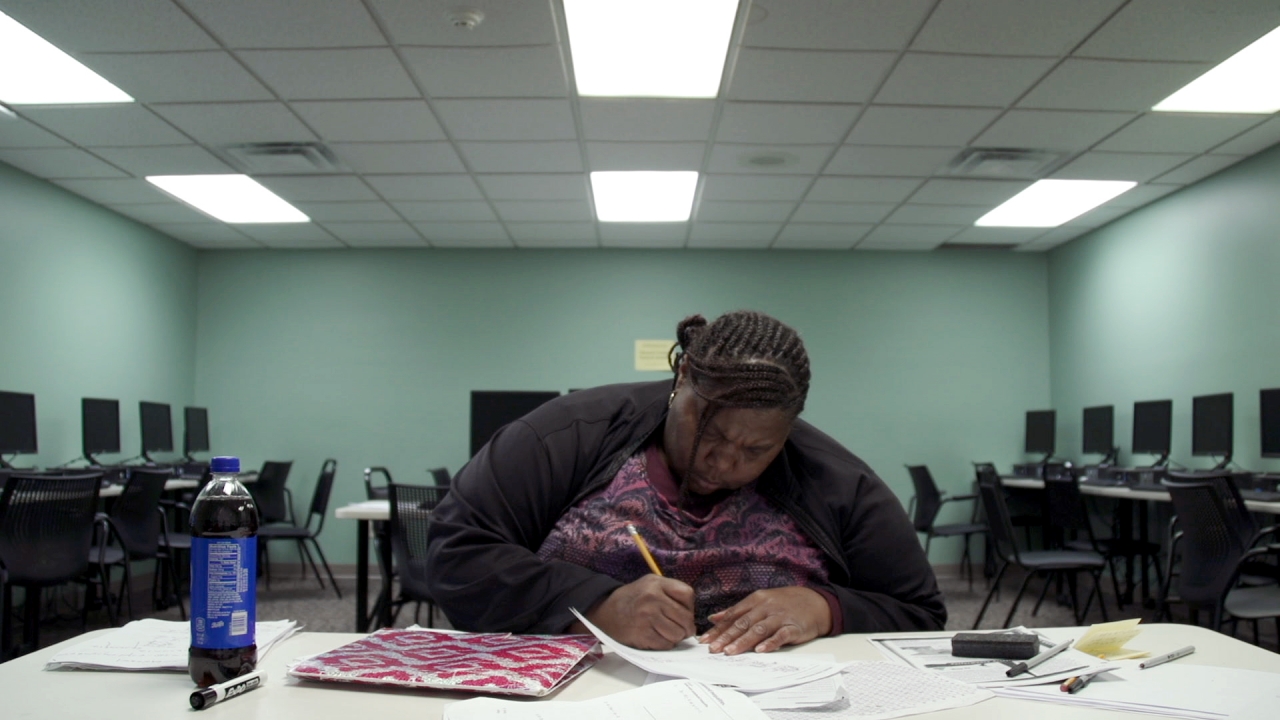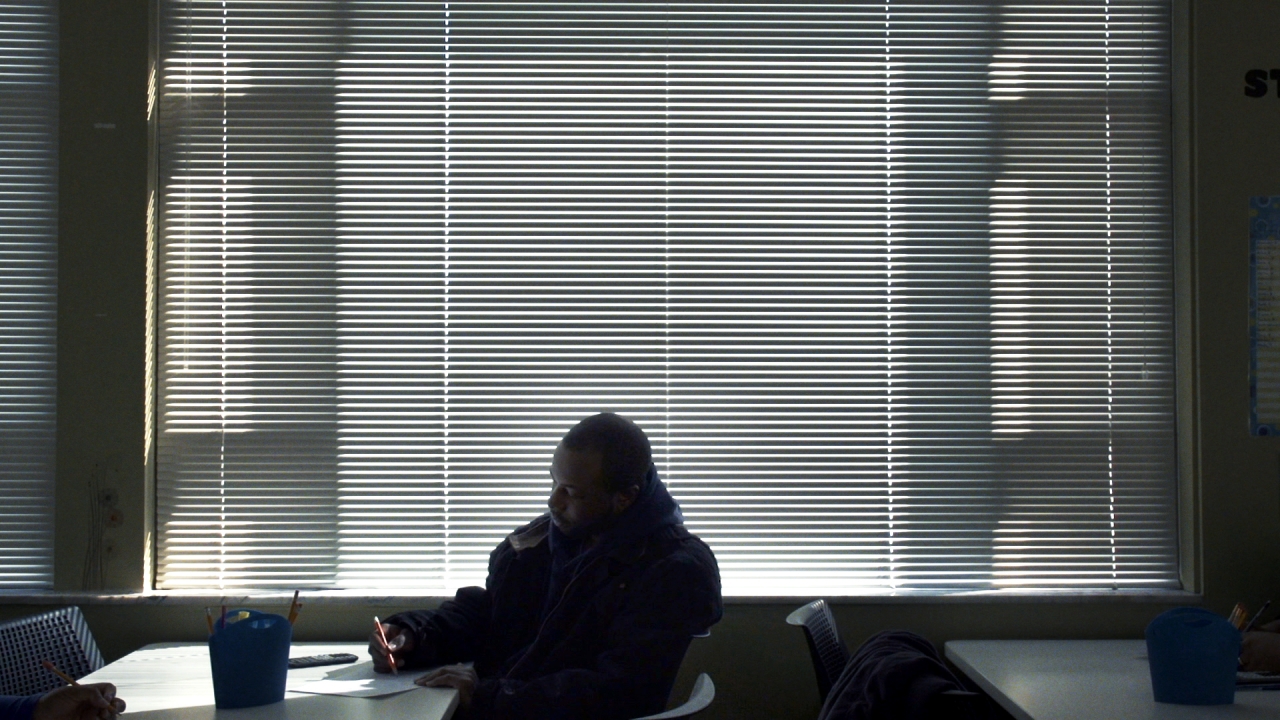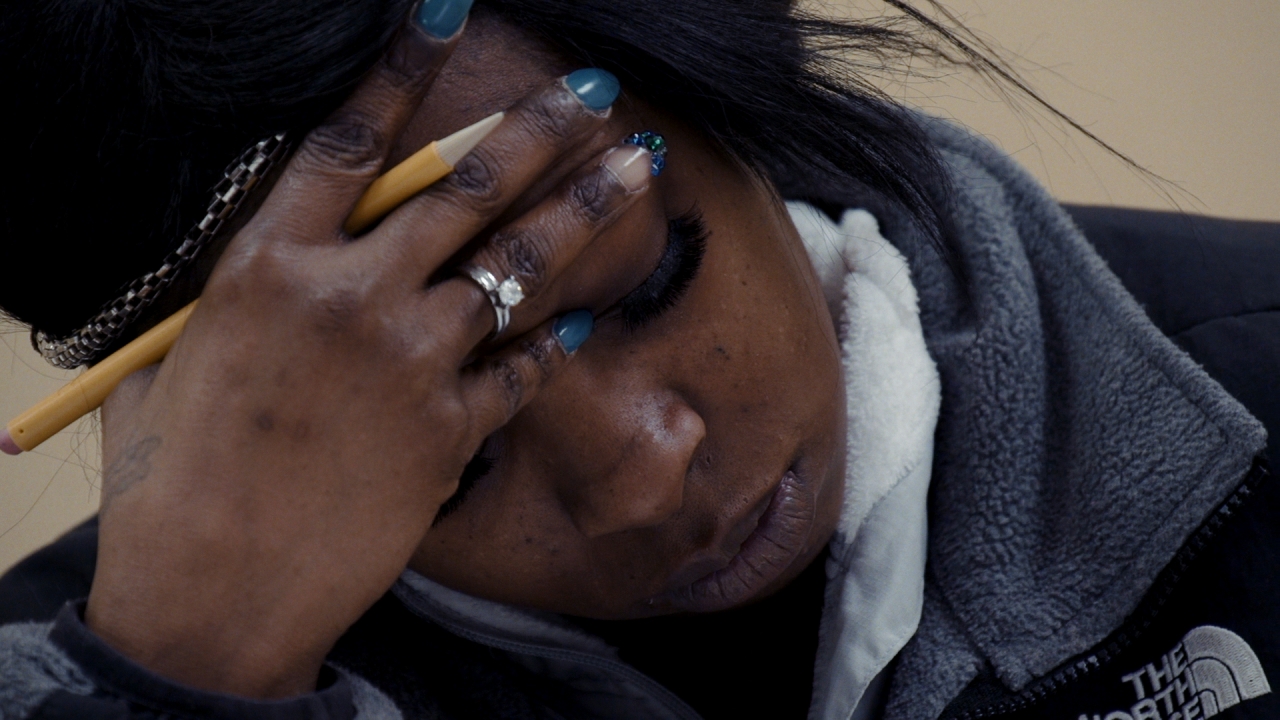
In our stratified American society, one's level of education is a major determinant of economic status, providing the credentials that can turn a job into a career. Night School, a new documentary from the Emmy-winning filmmaker Andrew Cohn, takes a humanistic, character-driven approach to the experience of 21st century urban poverty by focusing on adult students in Indianapolis—a city with one of the lowest graduation rates in the country—who belatedly attempt to earn high school diplomas while juggling a whole host of extracurricular challenges.
Night School concentrates its lens on the lives of three adult learners: Greg, a former drug dealer and single father looking to find a stable source of income; Melissa, a middle-aged grandmother trying to get the diploma that eluded her earlier in life; and Shynika, a twentysomething Arby’s employee with a budding passion for economic justice.
We spoke to Cohn by phone last month about his deeply affecting doc, which puts a fresh, socially-conscious spin on the "high school movie" genre.
The title Night School sounds like a Frederick Wiseman film, but your approach is pretty different. Why did you decide to make a film about these three individuals, as opposed to the institution?
Andrew Cohn: When you make a documentary, you have an original idea, and then you go as far away from it as possible, then somehow come back to the original idea. I always thought adult education was interesting. I got interested in this idea of people going back to face all these fears, and on a human level of what that would be like.
I was looking and researching adult education and going to schools, and I was pretty uninspired. Mostly it was five people on laptops in some grungy basement in Queens. And then I was watching PBS News Hour, and they had a one-minute segment about a school in Indianapolis, and I was like, "That's it! That's the school!"
I just wanted to focus on the human stories and find great characters and let the themes come out organically. I'd rather read an article in The Atlantic about something if I want to learn, but I go to the movies because I want to be moved. I come from a screenwriting background, so I wanted to find clear arcs and embed myself in the community.
I just went in and talked to everybody. I wanted to give a clear picture of how hard it is to pull themselves out of poverty. That was the main goal of the film: to show just how many obstacles there are for people who try to better themselves.
I think a lot of people—especially in the conservative state of Indiana—think, "Why don't they just go to school? Why don't people just go to school and get a job?" Well, it's not that easy. One of the things the film hopefully does is give you a real sense of the overall burden of living in inner city America, and just how many daily hurdles there are.
Your previous docs are sports-related, and Night School, as different as it is, has some of the dramatic momentum of a sports movie. We have a rooting interest in these characters, and they have a very clear goal or finish line. So since you also do screenwriting, what are the challenges of making a doc with a sports movie arc?
The reason I love documentary and the reason it's also a little bit terrifying, is that you really don't know what's going to happen. I even tell students of mine, "You want to be a great screenwriter? Go make a documentary; you're constantly confronted with issues of structure, character and character development—and all these things almost in real time."
While making this film, we followed a lot of different arcs and a lot of different characters, because ultimately they're not all going to pan out. For example, I followed the story of Melissa's son who lived next door and who was getting his child taken away by custody. I followed the story of her alcoholism and a few other things. And it wasn't until she met Rick on the bus—and I remember her telling me that one moment in that interview about how she felt really lonely and I said, "Oh, that's her story." So it's constantly shifting; you're following all these different characters.
There was a character that we followed for eight months who we were at the hospital with when she had her daughter; she didn't make it into the film. So I think it's just the comprehensiveness in following all these different storylines at once and then having the understanding to know which ones fit into the overall themes you're trying to explore.
There are quite a few challenges when you're trying to put together a strong narrative arc. These are real people's lives, so you have to have a sense of restraint to be able to pull it off and not have it come off as over-the-top or cheesy, or [directed]. You have to earn these moments.
The best moments in this film actually do feel scripted, and I don't mean that in a pejorative way. It’s incredible that you caught that moment of Melissa meeting Rick on the bus. Or when Shynika is approached by the Fight for $15 guys. These are major dramatic moments.
People say, "Man, you completely captured a lot of amazing moments on camera." Well, there's also a lot of really boring stuff that we captured. That's just the nature of shooting 700 hours of footage. And yes, you have moments that you capture that you just can't believe you're there, like Melissa meeting her boyfriend.
There are very few shots that are set up in the movie, but she used to take the bus everyday to school, and so one day I said, "Hey, we want to get some nice shots of you getting on the bus, so just do what you normally would do, but we're going to be across the street and we're going to put a mic on you." And lo and behold, I can hear it in their earpiece that she’s talking to this guy, and this thing happens.
With the Fight for $15, there's this opening and I just told Shnyika, "Look, I don’t know if you want to follow up on this Fight for $15 thing, but if you do, let me know so I can film it." For a film like this there's no big reveal at the end, it's not political, it's not sexy, it's not about some superstar. The movie really relies on intimacy. That was just our approach.
Ironically enough, a lot of the moments that I thought were amazing, when I went back in the edit and started editing, I'm like, "That's it? That's all that happened? It seemed so much more epic." And then some of the scenes—I remember specifically a scene with Greg and his daughter at the mall, and I remember getting back and being like, "Gosh, I just wasted two hours with him and his daughter while they fought over buying shoes." And then when I got in the edit I'm like, "This scene is the epitome of their relationship right there."

How did you decide upon Greg, Melissa and Shynika? I assume you were following other people throughout the whole process.
Yes. I guess what I'm trying to do as a filmmaker is communicate an overall experience. And what I wanted to do was communicate my experience there at the school. The school is 95 percent African American. I wanted people with a variety of stories. And also I look for stories; I never want to reinforce stereotypes. I'm always trying to find characters that go against stereotypes because I think people have an idea of Greg the drug dealer, the inner city guy who dropped out of high school. Yes, he’s all that, but he also has full custody of a daughter.
But typically when I'm looking for a character I'm usually looking for two things. One is a really engaging character. And Melissa's a great example: She has this great smile, this great personality.
And the other thing I’m looking for is a great story. Greg had a great story. Shynika was a great character. And then the other thing is I'm looking for is people who are willing to put themselves out there and be your partner on the film. And there were other folks we tried to include, like this one woman who had relocated after Katrina, a really engaging character who had a great story, but every time I'd call her to film she'd blow me off. So we interviewed a hundred people and followed probably seven stories that then became five, and then three.
But these were also, as time went on, the people who were willing partners, who were willing to expose themselves and let us in for the uncomfortable stuff.
If you're filming seven days a week, how do you divide your time between your subjects? Was it who's available and who isn't?
They were all at the school every day, so that was a common place where we'd be shooting them. And that was a challenge: How is this going to translate? Who wants to go watch three people sit in math class for two hours?
But typically I [would] ask them, What are you doing that week? What is your plan? There was a scene where Melissa was going to pick out her tombstone; I definitely want to film that. So we come along for that.
None of them had cars, so a lot of it was like, "Can I get a ride here?" So I was giving rides a lot, and that helped with me get access.
You and your director of photography were white filmmakers in a majority black environment. You also have a car and a college degree. How did you negotiate your outsiderness in this community?
Well, I think Greg thought I was a cop for three months. The first thing I thought about every single day was, as a white affluent male, how can I tell the African-American experience truly and honestly? And that was at the forefront of my thoughts each and every day, being conscious of it.
I feel like a lot of films about inner-city America, there's always a hero, like a white coach, or a teacher, or someone in power that is the savior. And that was one thing I was really conscious of because I didn't want to focus on the teachers, I didn't want to focus on the principal and why they do this. I wanted to really let [the three central characters] be their own voice and empower them to tell their own story.

I know you're from the Midwest but you no longer live there. Why did you choose to set your last two films in Indiana? Was it a fluke?
It was. Well, it was a bit of a fluke. The first one I actually just read from a New York Times article about the town of Medora by this guy named John Branch, and that's what brought me there. The second one was a fluke again; I was watching PBS. But I'm fascinated by the Midwest. I feel like there's an earnestness and an honesty there that comes across on camera.
Melissa asked me, I can't imagine how many times, "Why do you want to film this? You really want to film me making dinner? You really want to film me going on a date with Rick? You really think this is important?" And that kind of attitude just comes across on screen; they're not there to showboat, they're not surrounded by media, they didn't grow up in an environment where there are cameras everywhere or where anything's a big deal. And so that is really refreshing as a filmmaker to not have to deal with those kinds of hurdles, where people are just frank, honest and appreciative that you're there.
Night School opens in theaters June 9 through Oscilloscope Laboratories.
Akiva Gottlieb is IDA's Communications Manager and Associate Editor of Documentary magazine.
